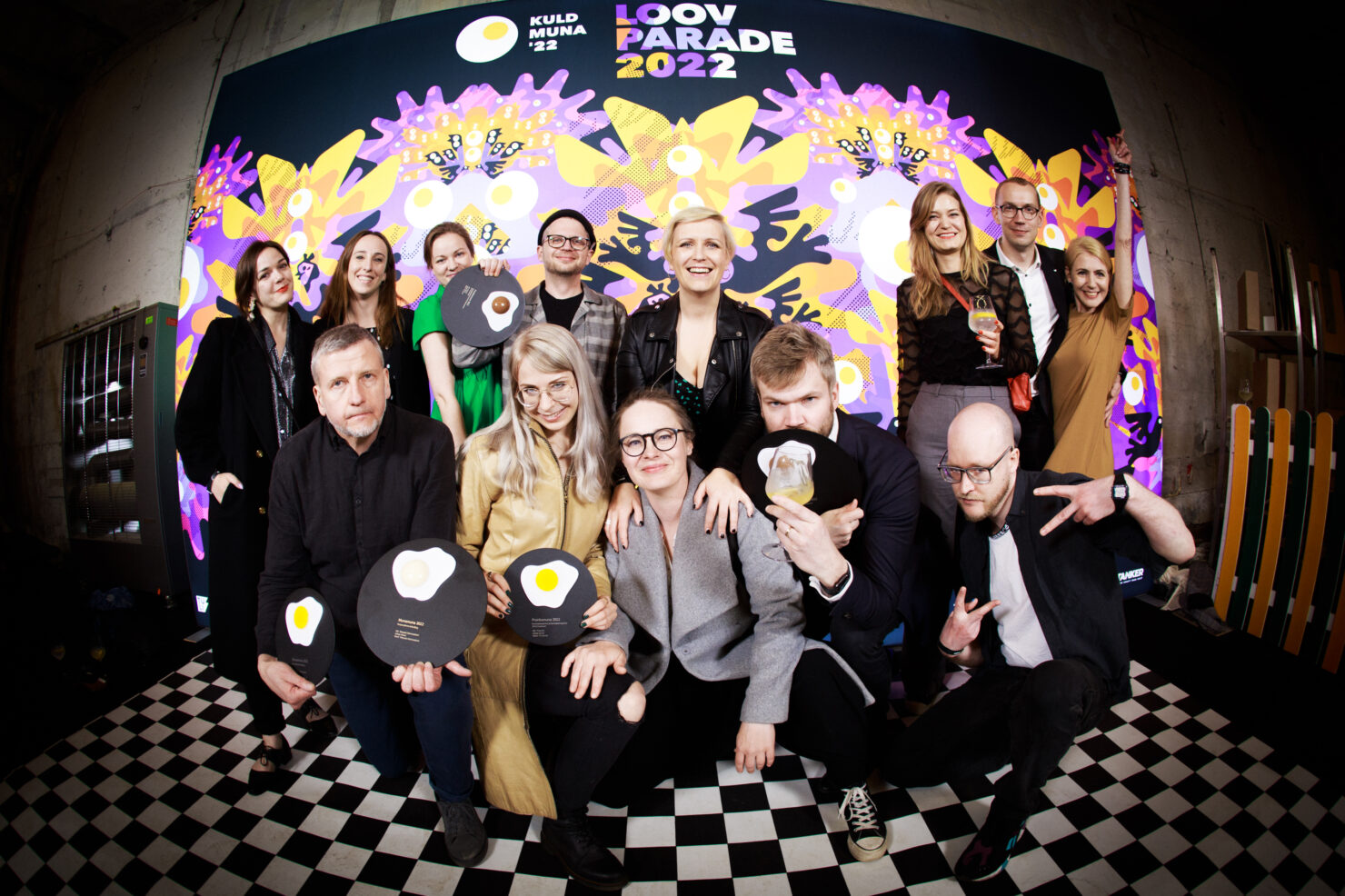July 1st, 2022 | Blog
Working remotely with a full-time job, helpful tips from an designer
Who else has been on a vacation and thought “Damn, I wish I could just stay here longer… take my laptop out, and…”. Such a cliché, but I bet there are many who have thought about that. In a way, yes, it is that simple. But then again, it isn’t. Let’s get into it.
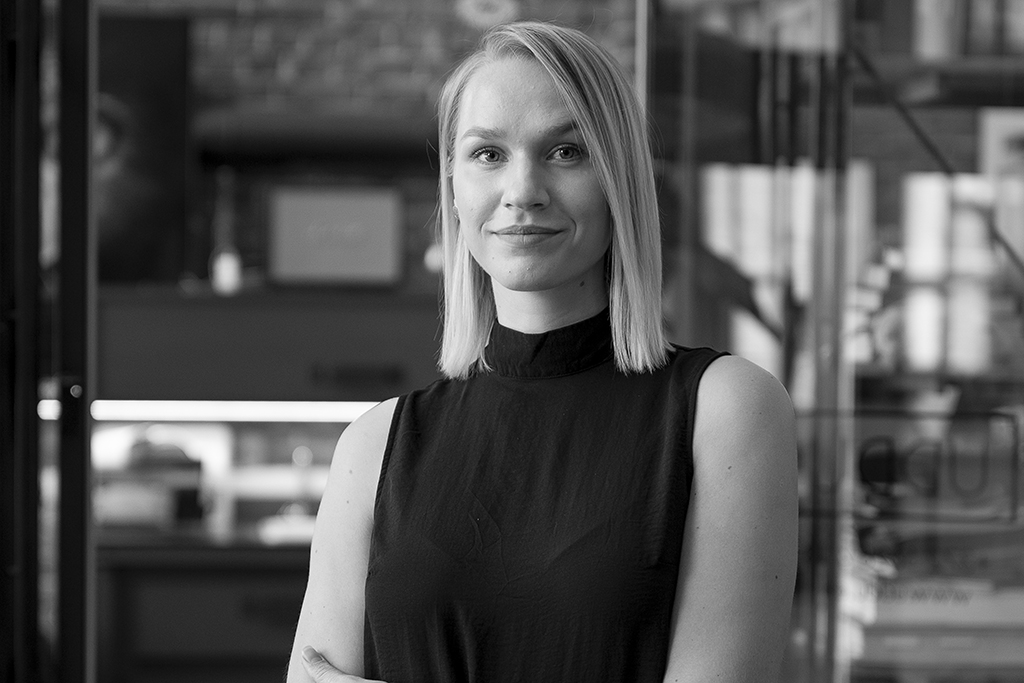
I won’t go over how Covid has changed the remote work, we all know that. I’m just so happy that my workplace encourages and allows me to live my dream – travel abroad when I want to and decide myself when I will return, with no loss of income.
I went fully remote as a full time employee to Madeira, Portugal in November 2020, and since then have done it from 2 countries and around 9 months in total from then on (by May 2022). During those months, we visited the Madeira island, Azores islands, Lisbon, Algarve, Naples, Amalfi coast, Rome & Sicily, all while working.
Since I have gained some experience, why keep it all to myself. I’m sharing it so anyone would have a softer landing, enjoy good environment for working and endure less blurry video calls.
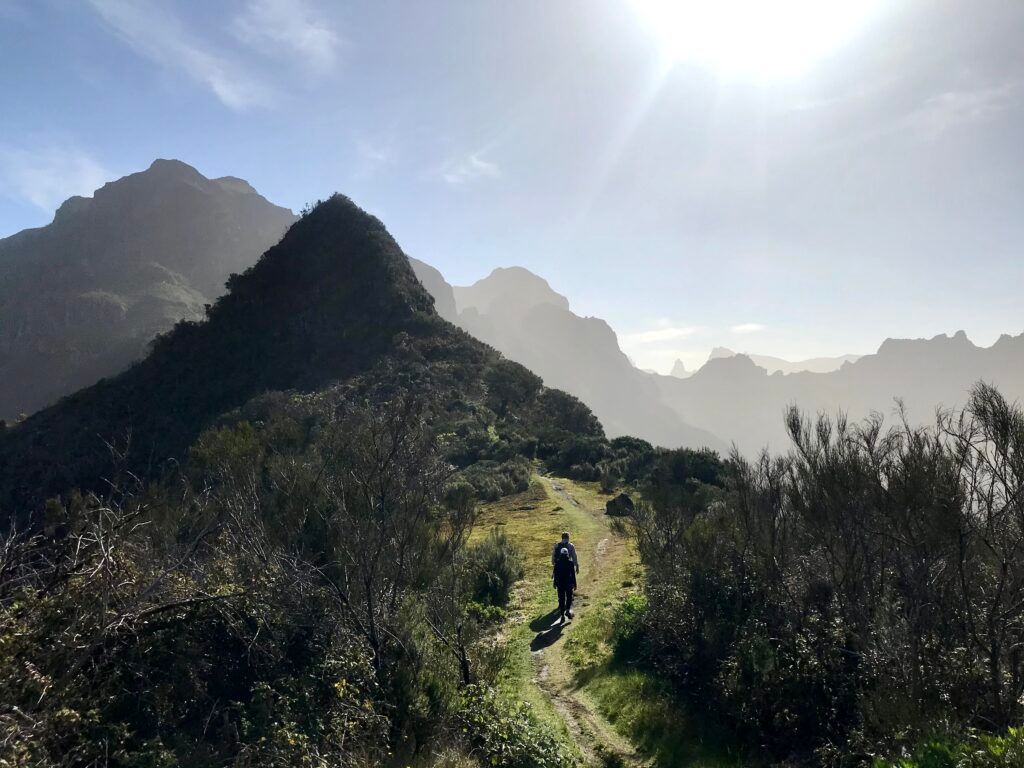
The destination
Everyone has their own dreams and goals where they want to travel and why, so that’s your call. But if you want to work remotely, just make sure you do some research about the following:
- Internet connection quality in that country and specific area you are planning to spend time in
- Do you need a visa and how long you can be there + all other documents
- Is there any digital nomad communities (also search from Facebook: Place name + Digital nomads e.g. “Italy Digital Nomads”)
- Maybe how normal/accepted is working from cafes, if you want to work like this sometimes & are there any co-working spaces nearby
- Good overview: Nomadlist.com. Costs depend on your lifestyle level, though
I’ll get to the internet part next, but last two is to make your life more interesting. Changing up your environment from the accommodation to half a day in a cafe, or on some days to a co-working space, can be very nice.
Also, if there is a thriving Digital Nomad (DM) community, it shows that the opportunities there are supporting this lifestyle. There is a reason why there are DM hotspots around the world (weather, internet, community, reasonably priced accommodation and food, available activities). For example, it’s not common to work from local cafes in villages in Portugal or Italy, or almost any other small places.
Finding the accommodation
Airbnb & Booking are probably your best options, but if you plan to stay for longer, it might pay off to only book the first week, and then start asking around. Search from nomad groups, expat groups and connect with locals to find local real estate agents, who might be able to rent short term (better than not finding a tenant at all). In many places you could get up to 2x lower monthly price than through booking platforms. It’s a hustle, but worth it when booking for 1,5+ months.
Also, consider sharing a bigger house with fellow nomads. Rent with friends, or ask around in nomad chats/groups. You could get a superb house with extra amenities/views/space, but half the price. Plus all the fun from living with others!
Places to search accommodation from:
- Airbnb.com
- Booking.com
- Google some co-living accommodation options in that area
- Flatio
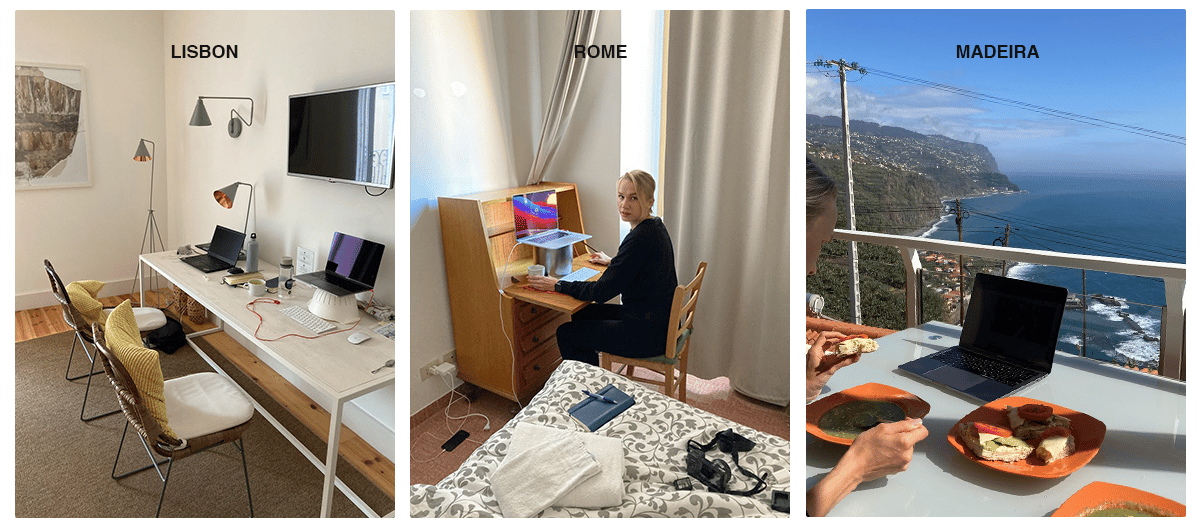
Internet connection
There are a few things you can do to make sure your accommodation has the connection you need.
When booking through Airbnb
Message the host before you make the booking.
In Airbnb, you can message your host before you book the place. You should ask:
- How is the internet connection quality in the apartment/house
- Do they have an internet cable coming to the house or what kind of connection they use
- Is the Wifi router in the accommodation (sometimes it’s in their own place next door or in the hallway or smth)
For example:
Hello! We are interested booking your place for a month to discover Lisbon and work remotely from there. But before booking, we need to know, how is your internet connection quality? What are the upload and download speed mbps?
Sincerely yours,
Hopeful Remote Worker
After they give you an answer and it’s not specific with numbers, or it seems they don’t know about the topic, ask kindly if they could make an internet speedtest in the accommodation using website speedtest.net and send you the screenshot of the result.
We have done this when we are booking a longer stay (from 1 week to 1+months), and usually the hosts are ready to do it. Of course there’s a chance that it’s not exactly the same when you are there and being in a different spot, but it helps. And don’t be afraid to complain or ask about improvements when the connection won’t meet the expectation/promise. We’ve gotten a new router, wifi extensions etc.
Search from the reviews “Wifi” keyword, and see if anyone mentions it.
When booking through Booking.com
In Booking, Wifi is usually mentioned separately in the reviews, so we’ve relied on that. Open reviews from the right corner, and when Wifi is separately mentioned with a green color and 9-10 points, then it should be okay (ofc keep in mind the amount of the reviews too).
I haven’t used the “Send a question” feature there, because reviews are more specific and we also use keyword search from the reviews if it’s not mentioned anywhere. And if not mentioned in the reviews, we usually won’t book if we absolutely don’t need it.
When you’re on location already
Send a message to the Airbnb host, ask if you can meet them and see the place before you book it, because it’s such a long stay. When there, ask about Wifi password and do the speed test yourself.
What numbers you need?
Here “the bigger the better” applies. Minimum for video calls for 2 people should be around 30 mbps download and 7 mbps upload speed. We’ve had really different places, some over 120/60 mbps and also managed everything around 23/10 mpbs.
I’m travelling with my partner, so I’m talking about numbers when 2 people are working with video calls and medium to large files.
Checklist when choosing your accommodation
Those are when travelling with a partner who also works full time, or a family. Solo is a bit easier.
- Tables. Make sure the place has at least 1 big table (like dinner table) and normal chairs at least for 4 people. Then it can fit 2 work setups (laptops + mouses and notebooks, etc). Or there’s just 2 smaller tables (rarely).
- Ideally there’s a second table somewhere, big enough for a full work setup.
- Two rooms with an option to close the door between. This is crucial when you have calls at the same time! So you understand why 2 tables are also necessary. Ideal – one table in kitchen/living room, one in the bedroom and door can be closed between.
These are actually surprisingly hard to find. And no, the tempting terrace table won’t do the thing most of the time, since you won’t be able to see anything in the sunlight 😀. Also battery dies fast. And you can’t use it with rain. Of course your needs vary depending of the job.
Again, don’t be afraid to ask extra amenities from your host, especially when you’re booking for 1+ months. The cost of a small table is so small compared to what they’ll get from you.
For additional comfort:
- Heating possibility depending of the season. Air conditioner with a heating or built in heating. Ask about it from host. It’s very necessary in southern Europe from November–March. Ofc, read about your destination weather, but keep in mind that most houses in southern Europe and many other places in the world don’t have the insulation we have in Estonia. My coldest living conditions ever have been in Madeira and Italy (when daytime temperatures were around 16–18C). Also, don’t be afraid to ask extra blankets or heaters!
- Fully equipped kitchen
- Outdoor space. Garden or a big terrace are so good for breaks on those long working days indoors
- Parking space (if necessary)
- Walkable surroundings. This has been important to me, because some houses can be next to highways, or very steep roads and they are designed to use only with a car. Estonians are quite used to having space or a normal roads to go for a walk, it’s not so common everywhere else. Check the streets with Google street view.
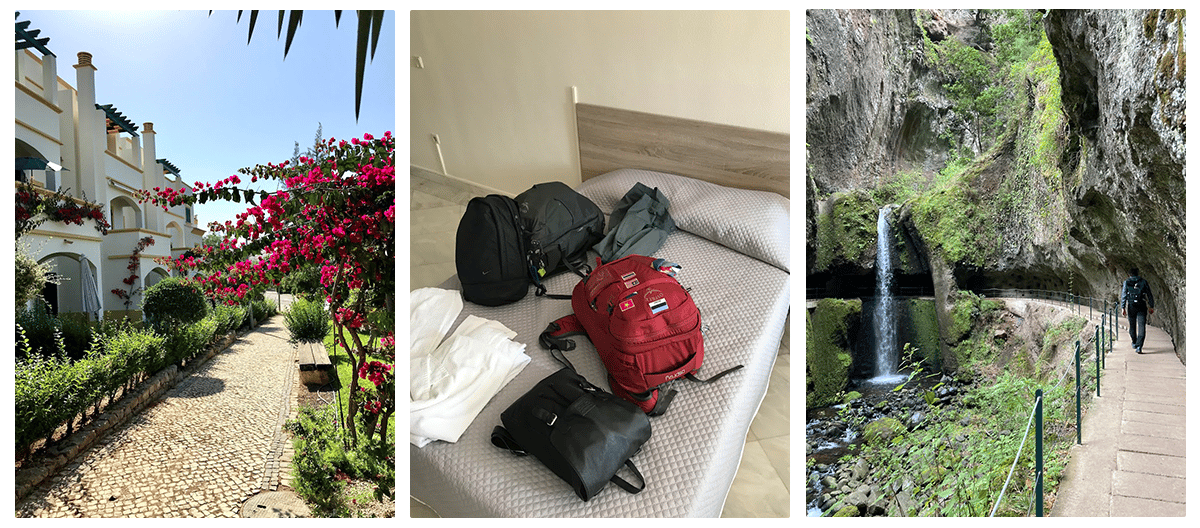
What to pack
I’m only listing some essentials for remote work.
- Day backpack, smaller backpack, like a schoolbag or your city backpack to carry computer and daily stuff when working from a co-working space or doing day trips.
- Keyboard, mouse and a laptop stand.
I personally have used the biggest bowl or soup pot I can find from the accommodation, instead carrying a normal laptop stand, but you can be more normal 😀. Planning to buy the laptop stand soon, tho.
Pack half, or even less then half of the clothes you would for vacation. 80% of the time you are working from home, so wearing same pants for a month. I promise. Pack your bag, and then eliminate half. Then you also have room to bring some cookies back to the office 😀.
Health, insurance & money
After covid hit the world, we chose to travel in EU countries for easier health insurance. Since everyones possibilities, time abroad and activites are different, I will just list some options that are worth researching:
Credit card with travel insurance:
- a) Swedbank Gold credit card for Estonian folks
- b) Revolut
- c) When you’re already abroad and need insurance, write personally to insurance companies and they could make you an offer, even when you’re abroad already. (Many have the condition that you have to be in Estonia/your home country to do it, but they can handle cases personally).
- d) Medical insurance and extra cover for medical transportation for example (it’s not covered with EU medical insurance, as far as I know).
Renew or order European Medical Insurance card:
- Estonians, read more about European Health Insurance Card from Eesti Haigekassa website
- And take it with you when you go to a pharmacy or any hospital! I got some good discounts for prescription drugs and even for analyses in a private hospital with it. Show it to people before any payments, ask if it helps.
Compare fees for taking out cash from ATM’s abroad with your debit/credit cards.
- a) Choose a package, that has some amount for free, or just the cheapest. You can also make an account & use it only for taking out cash if you don’t want to use the bank for anything else. ATM fees are ridiculous in some banks for abroad. If you do special deals with accommodations (find them through locals or smth), amounts can go bigger + for daily use, and you might end up paying like 30–40€ for fees fo the banks.
- b) Transferwise card
- c) Revolut card
It seems like a lot at first, and everyone just take what they want from this, but since I have figured it out already, it might help. And still, every place is different and takes time to know how things work around there, but having some basics helps a lot to still work efficiently and enjoy your stay abroad!
If you’re thinking about working abroad with us, don’t hesitate to check out the open positions.
